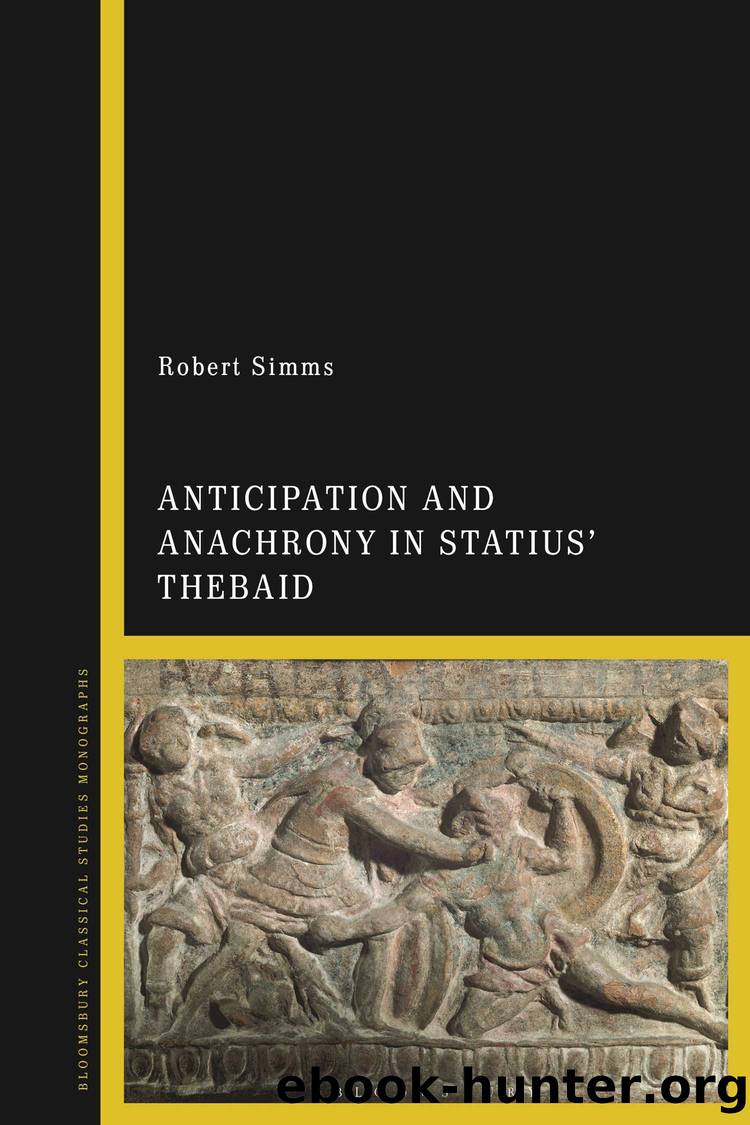Anticipation and Anachrony in Statius' Thebaid by Robert Simms;

Author:Robert Simms; [Simms, Robert]
Language: eng
Format: epub
ISBN: 9781350082595
Publisher: Bloomsbury UK
Published: 2019-07-30T00:00:00+00:00
innumeris ueluti leo forte potitus
caedibus imbelles uitulos mollesque iuuencas
transmittit: magno furor est in sanguine mergi
nec nisi regnantis ceruice recumbere tauri.
Theb. 8.593â6
As a lion having enjoyed innumerable kills passes unwarlike calves and soft heifers: he rages to wallow in great blood and set himself on nothing other than the neck of a reigning bull.
Tydeus has an overwhelming taste for blood but he wants a victim worthy of his effort. Thus, Statius leaves off tracking Tydeus presumably until the raging warrior can find a fitting adversary. There follows a brief interlude between Antigone and Ismene over the cause of all the suffering before Statius returns to Tydeus.
In the second part of Tydeusâ aristeia, we find him searching out Eteocles. When he finds the king, he calls him out. Eteocles replies by hurling a spear and Tydeus charges (8.695). Tydeus attempts to make his way to the king, paying little regard to the men in the line; although he maims and injures few. Finally, Melanippus hurls the fatal spear and Tydeus with his last bit of strength manages to slay Melanippus in turn. Tydeusâ comrades pull the hero from the fray despite his eagerness to fight on (8.727â30). As the great hero lies propped amid shields, he feels death claiming him: âet ipse recedere caelum | ingentesque animos extremo frigore labi | sensit,â âBut he perceives that the sky recedes and his mighty heart fails in that last chillâ (8.733â5).
The hero asks to see the head of Melanippus and his comrades oblige. Tydeus is described as âamens | laetitiaque iraque,â âmad with joy and angerâ (8.751) when he sees them dragging his foe toward him and he asks for the head to be removed. At this point, Tydeus appears content but Tisiphone urges for more: âinfelix contentus erat: plus exigit ultrix | Tisiphoneâ (8.757â8). When Athena arrives to bestow on him âdecus immortal,â she finds Tydeus eating Melanippusâ brains out of his skull and she flees. Divine immortality is lost to him.
What we find in Tydeus is an emphasis on limits; a character with immense power and ability that cannot control his battle lust and savagery, like Capaneus later. To be sure, we could dismiss his savage homophagy as the work of Tisiphone who possesses him. Yet, Athena cannot excuse the act and his comrades feel that he goes too far (9.1â4). So Statiusâ audience would have been unlikely to condone, or even excuse, his cannibalism.17 Statius has steadily built Tydeus to be consistent with this moment of violent excess.
Download
This site does not store any files on its server. We only index and link to content provided by other sites. Please contact the content providers to delete copyright contents if any and email us, we'll remove relevant links or contents immediately.
The Fine Print (Dreamland Billionaires Book 1) by Lauren Asher(2403)
Fury of Magnus by Graham McNeill(2364)
The Last House on Needless Street by Catriona Ward(2189)
The Rose Code by Kate Quinn(2087)
Malibu Rising by Taylor Jenkins Reid(1813)
Luster by Raven Leilani(1803)
Transcendent Kingdom by Yaa Gyasi(1772)
A Little Life: A Novel by Hanya Yanagihara(1771)
Moonflower Murders by Anthony Horowitz(1734)
The God of the Woods by Liz Moore(1582)
The Lost Book of the White (The Eldest Curses) by Cassandra Clare & Wesley Chu(1523)
This Changes Everything by Unknown(1426)
The Midwife Murders by James Patterson & Richard Dilallo(1382)
The Lying Life of Adults by Elena Ferrante(1353)
The New Wilderness by Diane Cook(1343)
Written in the Stars by Alexandria Bellefleur(1322)
Wandering in Strange Lands by Morgan Jerkins(1287)
Ambition and Desire: The Dangerous Life of Josephine Bonaparte by Kate Williams(1284)
The Lying Life of Adults by Elena Ferrante;(1237)
